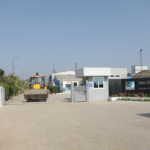Is a Non-Resident Indian (NRIs) from Cape Town, South Africa eligible to take loan against property in India? This is the first question that hits our mind when discussing loans against property for NRIs from Cape Town, South Africa in India. Yes, NRIs from Cape Town, South Africa can take loan against property in India. In times of financial crisis, properties are the most valuable tangible assets that can help you in getting out of that crisis. Properties are essential to liquidity as you can convert them into cash when you are in a massive financial crisis. Suppose you are an NRI and have a property in India, like the other Indian residents. In that case, you can apply for an NRI loan against property to meet your expenses and overcome a financial crisis.
There are a variety of Indian banks or National Non-Bank Finance Companies (NBFCs) that offer loans against property to Non-Resident Indians. The loan against property provided to Non-Resident Indians is called an NRI loan against property. So, like other Indians, you can also use your property assets to meet your financial expenses. The NRI loan provided against property has flexible end usage. One can use it for any purpose like debt consolidation, home renovation, purchasing a new property, wedding expenses, education expenses, etc.
The process to apply for an NRI loan against property is relatively easy and similar to the process for a loan against property to Indian citizens. Though the process can differ a bit in terms of documentation and eligibility criteria, applying for an NRI loan against property is easy. Many prominent banks offer NRI loans against property at attractive interest rates and minimal paperwork. To get an NRI loan against property, you need to have a residential or commercial property in India in your name.
NRIs in South Africa
The term “South Africa” comes from the country’s location at Africa’s southernmost point, formally known as the Republic of South Africa (RSA). The country was given the names Union of South Africa in English and Unie van Zuid-Afrika in Dutch upon its inception, reflecting its origins as the union of four formerly independent British colonies. The full formal name in English has been “Republic of South Africa” since 1961, and in Afrikaans, Republiek van Suid-Afrika. Each of the country’s 11 recognised languages has had an official name since 1994.
Capital – Bloemfontein (judicial), Cape Town (legislative), & Pretoria (executive)
Largest city – Johannesburg
Official languages- Afrikaans, English, , debele, Sepedi, Sesotho, Setswana, Swazi, Tshivenda, Xhosa, Xitsonga, Zulu
Population – 60,142,978 (2021 Estimate)
Area – 1,221,037 Sq. km
For much of the 20th Centuary, South Africa remoteness—it is thousands of miles from major African cities like Lagos and Cairo and more than 6,000 miles (10,000 km) from most of North America, Europe, and eastern Asia, where its major trading partners are located—helped to reinforce the official apartheid system.
With around 60 million inhabitants, the country ranks as the world’s 23rd most populous. Pretoria, Bloemfontein, and Cape Town are South Africa’s three capital cities, each housing the executive, judicial, and legislative branches of government. The largest city is Johannesburg.
The South Atlantic and Indian Oceans border South Africa on the south, Namibia, Botswana, and Zimbabwe on the north, and Mozambique, Eswatini, and the enclaved republic of Lesotho on the east and northeast. It is the most populous country south of the equator and the continent of the Old World’s southernmost country. With a diverse assortment of biomes, plants, and animals, South Africa is a biodiversity hotspot.
South Africa is a multicultural country with many different cultures, languages, and faiths. The constitution recognises 11 official languages, the fourth-highest number in the world, reflecting the country’s multicultural nature. According to the 2011 census, Zulu and Xhosa are the two most commonly spoken first languages (16.0%). The following two are European in origin: English (9.6%) symbolises the history of British colonisation and is widely used in public and business life.
Throughout the twentieth century, the black majority attempted to gain more rights from the country’s dominating white minority, which had a significant impact on the country’s recent history and politics. Apartheid was established in 1948 by the National Party, which formalised racial segregation. The repeal of discriminatory legislation began in the mid-1980s, after a lengthy and often violent campaign by the African National Congress (ANC) and other anti-apartheid activists inside and outside the nation.
In the country’s liberal democracy, which includes a parliamentary republic and nine provinces, all ethnic and linguistic groups have had political representation since 1994. South Africa is frequently referred to as the “rainbow nation” to represent the country’s multicultural richness, particularly since apartheid ended.
South Africa is a global upper-middle power with major regional influence and membership in both the Commonwealth of Nations and the G20. It is a developing country, with a Human Development Index of 114. It is a recently industrialised country, according to the World Bank, with the second-largest economy in Africa and the 33rd-largest in the world. In Africa, South Africa has the most UNESCO World Heritage Sites. South Africa’s government accountability and quality of life have significantly improved after the end of apartheid. However, violence, poverty, and inequality persist, with about a quarter of the population unemployed and living on less than US$1.25 per day in 2008.
Constitutional Framework of South Africa
The South Africa Act of 1909, enacted by the British Parliament, merged the Cape of Good Hope and Natal, two former British territories, with the Transvaal and Orange Free State, two former Boer (Dutch) republics. The new South African Union was built on a parliamentary system, with the British queen serving as the head of state. The Republic of South Africa Constitution Act of 1961 made the nation an independent republic from a British Commonwealth dominion.
South Africa’s political evolution has been affected by its colonial past and the white minority’s adoption of apartheid policies. A new nonracial interim constitution was ratified in 1993 and took effect in 1994, following massive protest and social instability. In 1997, the interim text necessitated a new, permanent constitution, which Parliament prepared in 1996.
Cultural life Of South Africa
South Africa is a study in contrasts, blending Western technology with indigenous technology, Western customs with African and Asian cultures. It also teaches about how cultures can sometimes blend, sometimes clash; for example, the villas of South Africa’s white elite and the tar-paper shacks of Black day labourers, office buildings with the most sophisticated electronic wiring and one-room houses without electricity are all within a short distance of one another. In terms of education and economic opportunities, there is still a significant divide between the white minority and the black majority. Nonetheless, South Africa is steadily removing some of these historical inequalities and their repercussions.
What is meant by loans against the property for NRIs from Cape Town, South Africa in India?
Non-Resident Indians from Cape Town, South Africa who are owners of residential or commercial property in India can apply for an NRI loan against property at any prominent bank providing this service. The best part about NRI loans against property is that the banks offer them at attractive interest rates with minimal paperwork to ensure the applicant’s comfort. The individual can apply to various leading banks like Axis Bank, State Bank of India, Federal Bank, IndusInd Bank, and many more. It would be best to compare these banks’ interest, processing fees, and loan tenure before applying for an NRI loan against property. It would help if you always chose a bank after doing a lot of research and which best suits your requirements. Remember that the interest rates and other charges of NRI loans against property are subject to periodic changes without prior notification, so you should consult your bank and carefully read all the documents before applying for the loan.
Eligibility criteria to apply for an loans against property for NRIs from Cape Town, South Africa in India

To apply for an loans against property for NRIs from Cape Town, South Africa in India, the individual needs to meet some essential criteria, which are as follows: –
First of all, the Non-Resident Indian or the person of Indian Origin from Cape Town, South Africa should have a residential or commercial property in India in their name to apply for an NRI loan against the property. In case the residential or commercial property of the NRI is not registered in their name, they can use the property registered in the name of the spouse, parents, children, siblings, etc.
The NRI loans applied under loans against property should be liquidated before the principal borrower reaches the maximum age issued or defined by the lender or bank.
Besides this, the bank should define the minimum net monthly income of the Non-Resident Indian who is applying for the loan.
Lastly, the minimum age required to apply for an NRI loan against property is 21 years, and the maximum age is 65 years.
Remember that the above the given eligibility criteria can vary from lender to lender or bank to bank. The above-given eligibility criteria are the basic eligibility requirements that every bank demands. Still, there is a high possibility that the bank or lender has some additional terms and conditions that an individual or applicant is required to fulfill.
Important documents required to apply for a loan against property as an NRIs from Cape Town, South Africa in India
Congratulations if you pass the eligibility criteria and meet all the requirements. If you are eligible to apply for an loans against property for NRIs from Cape Town, South Africa in India, you need to provide certain documents to apply for a loan against property as an NRIs from Cape Town, South Africa in India. The following are the documents that an individual is required to submit while applying for the NRI loans against property in India: –
First, the individual must fill out a loan against property application form.
After that, the applicant is required to submit identity proof. One can use their Aadhar card, passport, driving license, voter ID card, and Government of India-issued photo ID to prove their identity.
Next, the individual is required to have a valid visa or work permit copy or an Overseas Citizen of India card.
Besides this, the individual must provide a passport with relevant visa stamps.
The applicant must also submit a copy of their Permanent Account Number (PAN) card.
Next, you have to submit your signature proof; for that, you can use your Permanent Account Number (PAN) card but certificate (Secondary School Certificate) SSC mark sheet or passport.
Along with this, the individual needs to submit a copy of one of the following documents; Aadhar card, driving license, and latest utility bill. The utility bills can be any bill; it can be an electricity bill, gas bill, telephone bill, or if you don’t have any utility bill, then the individual can also show their property tax receipt.
Lastly, the applicant is required to submit his income proof.
Salaried applicant
If you are a salaried applicant, you need to submit your salary slips, 6 months statements of Non-Residential External and Non-Residential Ordinary Bank account, and form 16.
Self-Employed applicant
If the individual is self-employed, the applicant must submit two years of Income Tax Return(ITR), computation of income, and the tax audit report. The individual is required to present a tax audit report if the gross turnover of the income exceeds one crore rupees or the gross receipt exceeds twenty-five lakh rupees. The applicant is also required to submit a profit and balance sheet, which should be verified by a chartered accountant, and a self-attested document stating the nature of the business.
The above-given documents required to apply for an NRI loan against property are generic in nature and can differ from lender to lender or bank to bank. Although there are high chances that the documentation will differ from bank to bank or lender to lender, the above-given documents are the basic documents that every bank or lender demands while providing an NRI loan against property.
The process to apply for an loans against property for NRIs from Cape Town, South Africa in India

If you want to apply for an loans against property for NRIs from Cape Town, South Africa in India, then you should follow the below-given three steps to get NRI loans from a good bank that meets your requirements. Follow the below-given steps to apply for an loans against property for NRIs from Cape Town, South Africa in India as an NRI: –
Step one: Research thoroughly
This is the mandatory and the most important step. It would help if you did more and more research before applying for a loan against property in India. It is one of the most important steps that many people avoid or do not focus on; that’s why they cannot find the ideal bank to apply for an NRI loan against property for themselves. We know that there are many fishes in the sea, but you can only choose the best for yourself if you have researched enough.
A variety of banks offer NRI loans against property, but not everyone meets your requirements. Each bank will have its own set of terms and conditions, interest rates, and repayment options, so to find your perfect banking partner that suits your requirement, one should always research thoroughly. You should always choose a bank you can afford and comfortably repay the loan. After finalizing a few banks, you can also talk to their customer care representatives to get answers to all your queries. We would recommend you also visit the nearest branch of that particular bank.
Step two: Assemble all the required documents
You need a loan urgently, but some of you are documents are missing. Even the imagination of the situation is horrible. To apply for an NRI loan against property, an individual is required to submit a whole bunch of documents; especially if you are an NRI, you need to submit a lot of documents like identity proof, address proof, income proof, etc. So, to keep the process easy and simple, you should always assemble the required documents in advance to avoid a last-minute fuss. The documentation may vary depending on banks and lenders, so we recommend you visit the bank and ask them about the necessary documents you need to submit while applying for the loan. You can also visit the bank’s website for the same. In the article, we have already mentioned the possible documents that a bank will ask you to produce while applying for an NRI loan against the property; we will request you to read the article from the beginning to the end carefully.
Step three: Fill out the application form
After doing all the necessary research and collecting your documents, you should fill out the application form for a loan against the property. You can apply for an NRI loan against property by filling out the form online, as the majority of banks facilitate their consumers, or you can directly visit the bank branch for the same. Sooner or later, the individual is required to visit the bank in person and submit their documents, so we suggest you go to the bank and fill out the form and then submit all the necessary documents.
See how easy, convenient, and hassle-free it is to apply for loans against property for NRIs from Cape Town, South Africa in India.
Benefits of applying for loans against property for NRIs from Cape Town, South Africa in India
There are multiple benefits of applying for an loans against property for NRIs from Cape Town, South Africa in India.
If the individual applies for an NRI loan under a loan against property in India, then the individual is not required to submit any collateral or security. This is because the individual is taking an NRI loan under loan against property in India, so the residential and commercial property that the individual is using to apply for the loan serves as security or collateral.
Secondly, you can avail up to 15 years of loan tenure or even more than that if you apply under the NRI loan against property.
The bank will provide you with a loan on different kinds of property; it can be a commercial property, residential property, home, shop anything.
Besides this, many banks offer attractive interest rates, so it is advised to compare the interest rates of different banks before applying for a loan.
Some banks or lenders allow the applicant to transfer their existing loan. It means that if they already have a loan in any other bank, they can transfer it to their current bank in which they are applying for an NRI loan against property. For example, Axis Bank allows the transfer of the existing loan. That’s why we always suggest you compare the policies and benefits of all the banks before applying for a loan.
Conclusion of Loan Against Property as an NRIs from Cape Town, South Africa in India
An NRI loan against property is one of the secured loans that is sanctioned against the asset pledged as collateral by the applicant. You can use any of your assets, your land, a house, or any other residential or commercial property to apply for an in against property in India. However, you should know that the asset remains collateral with the lender or bank until the applicant repays the entire loan against the property amount. A loan against property is considered the safest by banks and lenders because they have property papers as collateral, and the bank is authorized to seize your property in case you cannot repay the loan.
We will advise you to calculate and compare the interest rates, loan tenure, repayment options, and terms and conditions of different banks before applying for NRI loans in any bank. If you don’t have a property in your name, then you can use the property of your spouse, children, or siblings to apply for an loans against property for NRIs from Cape Town, South Africa in India. You are requested to select the bank after thorough research and always choose a bank that meets your requirement and profit appetite. If you have any queries or doubts, you can consult with your bank or lender. The applicant should meticulously read the documents and terms and conditions provided by the bank or lenders to avoid any fuss.
Frequently asked questions about loans against property
What is the procedure for applying for a loan against property as an NRIs from Cape Town, South Africa in India?
To apply for a loan against property in India, you can visit the branch of the respective bank, or you can also do online research and fill out the application form. The process of NRI loan against property is similar to the process of loan against the property of Indian residents; the slight difference between both is the eligibility criteria and documents needed to apply for a loan against property as an NRI.
Which bank is the best to apply for an loans against property for NRIs from Cape Town, South Africa in India?
Every lender and bank has its own set of rules, interest rates, the quantum of loans, lending tenure, repayment options, and terms and conditions. So before applying for a loan against property in India, the applicant should always compare the repayment options, loan tenure, the quantum of the loan, interest rates, repayment options, and the terms and conditions of banks and lenders. It is best to choose the bank that full fill or meets your requirements. Besides this, you should always clear all your doubts from the banker or lender before applying for the NRI loan against property.
When applying for an loans against property for NRIs from Cape Town, South Africa in India, what maximum loan amount can one get?
An individual can easily avail NRI loan against property in any leading bank. The amount from 5 lakh rupees to 15 crore rupees is available on an NRI loan against property.
Can I apply for an loans against property for NRIs from Cape Town, South Africa in India if I already have an existing loan?
Yes, if an individual already has a personal loan, they can still apply for an loans against property for NRIs from Cape Town, South Africa in India. There is no boundation, and the majority of the bank will accept your loan request because you are still eligible to apply for a loan against property. Though some banks have different policies or eligibility criteria in those banks, you have to check and ask this particular question. Otherwise, the majority of banks allow applying for another loan if the applicant already has an existing NRI personal loan.
What is the security or collateral an NRI must submit while applying for a loan against property?
While applying for a personal loan, the individual must have collateral or security in case of a secured personal loan. But in an NRI loan against property, the applicant’s residential or commercial property is the security as the individual is pledging its Indian residential or commercial property while applying for the loan. So, because you already applied for the loan under loan against property, you don’t need to submit any collateral or security in the bank.








































